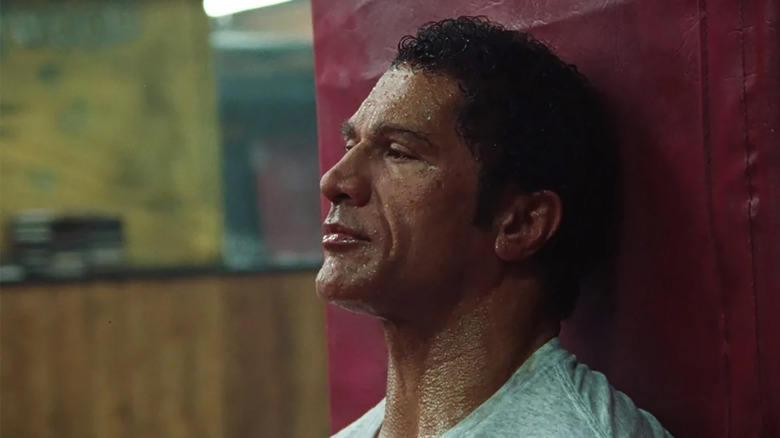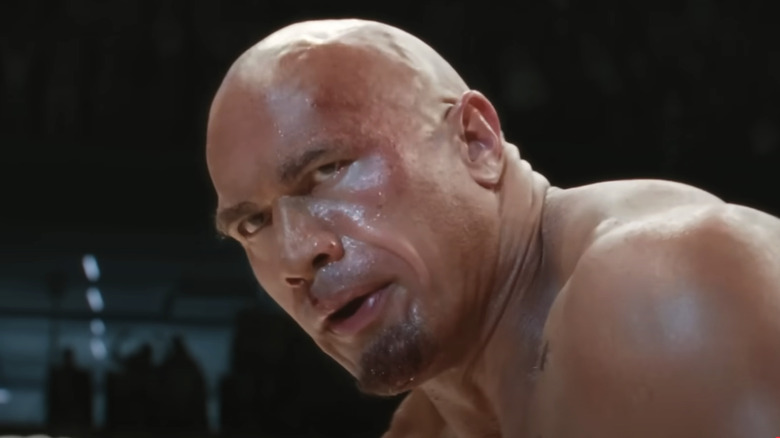There's One Thing The Smashing Machine Does Differently From Every Other Sports Movie
Beware, this article contains major spoilers for "The Smashing Machine," in theaters now.
From "Rocky" to "Rush," so many sports movies, whether they're about boxing, racing or any number of athletic competitions, are often about the glory of victory and the arduous journey to get there. But every now and then, what initially seems like a typical sports movie goes against the grain and digs a little deeper beyond the final triumph. In fact, sometimes the movie is better when the athlete we've been watching ends up losing. "The Smashing Machine" is one of those movies.
Benny Safdie's biographical sports drama "The Smashing Machine" follows Dwayne Johnson giving an Oscar-worthy performance as Mark Kerr, an amateur wrestler turned mixed martial arts (MMA) fighter at a time when the intense sport had yet to drum up massive moneymaking deals for those taking punches and kicks in the octagon arena. The sport of MMA fighting was seen as barbaric, and during Kerr's time as a fighter, the Ultimate Fighting Championship (the top tournament in the United States) was banned in 36 states. This meant Kerr often traveled to Japan to fight in major tournaments; he wasn't a household name like Conor McGregor or Georges St. Pierres.
For the most part, "The Smashing Machine" follows a similar trajectory to a lot of sports movies. We watch as Kerr trains hard for his fights, he has an unstable relationship with his girlfriend Dawn (Emily Blunt), his undefeated record is broken with his first loss, and most significantly, throughout all of this, he's addicted to opioid painkillers because of the agonizing toll fighting takes on his body.
Safdie doesn't give Mark Kerr a triumphant rise from his low points. When Kerr loses a potentially life-changing fight that could have won him $200,000, it's not a happy ending. However, what's interesting is that the drama leading up to this doesn't hit the same peaks and valleys that plenty of other sports movies have traversed in the past. Instead, Kerr is mostly presented as a normal guy, and "The Smashing Machine" ends up not being about the glory.
It's the kind of sports movie you'd expect A24 to make
Instead of a career-defining biopic about an iconic athlete, "The Smashing Machine" is about showing Mark Kerr as a normal guy who went through some average trials and tribulations and came out of it on the other side just the same. It subverts what you'd expect from any other movie of its kind.
After Kerr's first loss, he spirals with his addiction and has a temporary separation from Dawn. Kerr overcomes his drug addiction, and there's no dramatic relapse. We witness a couple of intense arguments, including one where Dawn threatens to shoot herself, but it doesn't escalate beyond that. However, there's also no triumphant comeback either. Kerr trains for the upcoming big fight, but instead, his best friend and trainer Mark Coleman (Ryan Bader) goes on to win the $200,000. It should be noted that we also see Coleman living an even more mundane life with his wife and daughter.
This might make the movie feel boring or inconsequential to some viewers, but I think that's the point. Kerr endured a fighting career that was once promising, and he won his fair share of tournaments, but it ended up fizzling as the years went on. While he can undoubtedly be proud of what he accomplished, the result was Kerr being no different than anyone else who overcomes their own demons and settles into a regular life.
Indeed, the end of the movie does what so many adaptations of true stories have done: It shows the real Mark Kerr grocery shopping for himself. Meanwhile, text explains what happened with his career and his relationship with Dawn. They ended up getting married, had a son, and got divorced. Kerr fought until 2009, but he only won two out of nine fights across the 10 years following the major loss depicted in "The Smashing Machine." The purpose of this moment goes beyond equating the real man with the version we just saw on screen played by Dwayne Johnson.
Mark Kerr was just a normal guy
This is where the movie's intention becomes clear. Further text points out that Mark Kerr and Mark Coleman never really received the recognition that today's MMA fighters have gotten; some of the biggest fans of the sport never even knew their names. After this, we watch as Kerr packs his groceries into his truck, occasionally muttering and laughing to himself about something he observed in the parking lot of the store. Finally, he acknowledges the cameras, waves, and says bye. He could be anyone's father just out at the grocery store on a Sunday.
It was only in June 2025, largely because of "The Smashing Machine," that Mark Kerr was inducted into the the UFC Hall of Fame as part of the promotion's Pioneer Era Wing. Dwayne Johnson introduced him at the induction ceremony and presented him with the honor. Otherwise, Kerr's fame was almost non-existent in the 21st century.
"The Smashing Machine" is the English translation of Mark Kerr's fighting nickname, "Máquina de Bater," which he received from Brazil's Tatame magazine. While it might sound a bit hokey, the true smashing machine may be the world of MMA fighting, a sport that beats many competitors into submission but only gives a select few of them the glory that they seek.
"The Smashing Machine" is playing in theaters now.


